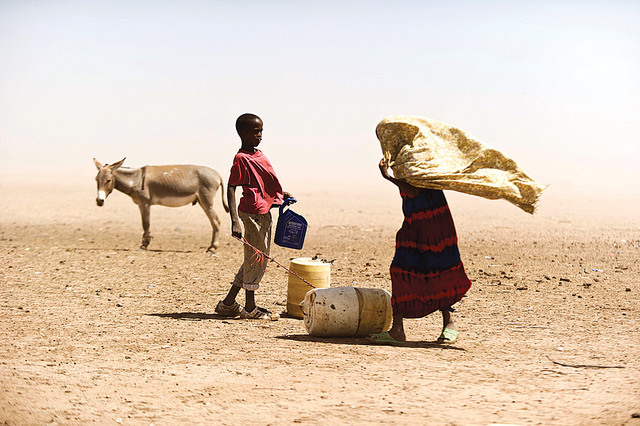In the last ten years or so, the development community has devoted more and more time and energy to address the challenge of malnutrition, and rightly so. Just Google search and review some of the speeches of the leaders of the world’s leading development organizations. Yet, the global call for addressing and eliminating malnutrition in all its forms continues to be unheeded by national governments and their policymakers in a number of developing countries. Malnutrition can result from undernutrition from calorie and protein deficiency and from a lack of micronutrients. Overnutrition, resulting in overweight and obesity, is another form of malnutrition. Combined, these are called the triple burden of malnutrition. To be fair, considerable progress has been made. Some developing country governments are making concerted efforts to address the malnutrition challenge. But such successes continue to be few and far between. By and large, there is general agreement in the development community that necessary investments—in the form of mobilizing financial and human resources to fight malnutrition problems—have been grossly inadequate.
Researchers have been studying the indicators and causal factors of malnutrition for decades. Starting with the contentious debate over the nostrum, “if you get adequate calories and proteins, you should be getting enough micronutrients,” to the question of how to analyze the demand for food, we have produced a large volume of nutrition policy literature. We have focused on how to get the right combinations of food, care, and health-related inputs to households and individuals, realizing that food alone is not enough to achieve optimal nutrition. We have also examined individual causal factors such as intra-household dynamics and externalities, caregiving, gender imbalances, maternal education, and behavior change communication (currently regaining its momentum), in as much detail as they could be studied.
In the meantime, it has been rewarding to join in the work on program evaluation so that we can advise governments how to design large-scale nutrition interventions. Lessons from major nutrition-related intervention programs throughout the developing world have been well documented. In the mid-1990s, we noticed and started to address the then-growing problem of overweight and obesity in the form of nutrition transition, as developing countries shift to more “developed” diets. A phenomenon in many middle- and high-income countries, overnutrition has become a critical issue now for low-income countries as well.
As we study these different thematic areas, however, we seem to be going around in circles. In the 1970s, we recognized the importance of nutrition through agriculture and moved on to other themes, only to rediscover it again. In recent years we have been advocating to address agriculture-nutrition-health in a holistic manner. Similarly, in the mid-1980s we worried about the role of businesses in providing nutrition and nutrition fortification. Training table salt manufacturers to fortify their product and developing public-private partnerships were major regulatory issues. While challenges remain for testing and meeting such standards in many developing countries, we are currently heading in a new direction, examining how small- and medium-scale business can be made sustainable to deliver on nutrition. We are now also concerned with how transparent multinational firms really are in their commitment to nutritional outcomes. While certain thematic areas keep coming back for research and analysis, real action—implementing key findings on the ground—has lagged due to capacity challenges.
With this accumulated body of knowledge spanning various spheres of nutrition policy, some researchers are now asking: “Why we are not making enough progress in solving malnutrition problems?” We all have some answers and hypotheses about this. For some, it is a failure to invest enough money, for others lack of leadership, or poor governance, or poor implementation. And of course, for researchers the answer is more research. These are all correct explanations, as malnutrition is a complex, multifaceted problem that requires solutions from multiple disciplines, depending upon the most constraining factors in different country and problem contexts.
Yet for those involved in program design and implementation at the country level, a major challenge continues to be the lack of human resources. We need more people who are well-equipped to address the malnutrition challenges from multidisciplinary and multi-sectoral perspectives. In some countries, reputed social scientists who do not have a basic understanding of developing countries’ nutrition challenges head up policy making bodies, and highly trained nutritionists remain disconnected from the policy process. Often nutrition and policy work remain in their own silos. It is easy to imagine the condition of countries with these problems. The absence of qualified people working to apply data-driven scientific findings to craft effective policies is one reason why nutrition policy making and program implementation seem to be eternally under construction.
So what can we do? To address developing countries’ staggering lack of progress in addressing malnutrition, we need to train a new generation of policy and program managers who can traverse the disciplines engaged in nutrition schemes and policy making. But who will do this and how? The single discipline orientation of academic institutions in both developing and developed countries has made this a major challenge. Some university multidisciplinary programs have trained enough people to greatly improve the development of multidisciplinary capacity to solve malnutrition problems. But such programs continue to be limited in number. In general, multidisciplinary work is not supported or encouraged. For example, a faculty member moving out his or her core discipline to publish in multidisciplinary journals may not receive recognition equal to a peer who remains in her or his core discipline. Nutrition policy is an example of a development challenge where several disciplines need to come together, but academic institutions—particularly in developing countries—are simply not fully prepared to face malnutrition challenges.
If we really want to develop multidisciplinary capacity we must begin to bring the disciplines of nutrition and the social sciences together to contribute to effective policy making and program implementation. In a new book, Nutrition Economics: Principles and Policy Applications (by S.C. Babu, S.N. Gajanan, and J.A. Hallam; published by Elsevier/Academic Press), we make a modest attempt to introduce basic economic concepts and their policy applications to scholars with a nutrition and some quantitative background. We also introduce several analytical methods that use real world data to explore nutrition-related policies.
More interdisciplinary approaches will be essential to develop adequate capacity at the global, national, and local levels for translating the Sustainable Development Goals (SDGs) into actionable programs and impact. It is one thing to stand on the sidelines and call for more nutrition investment when developing country governments lack the institutional or human capacity to truly have an impact. It is another matter entirely to take a new approach and organically build such capacity at the country level. We hope our book makes some contribution and difference to these efforts.
Suresh Chandra Babu is is a Senior Research Fellow and Head of Capacity Strengthening at IFPRI.







